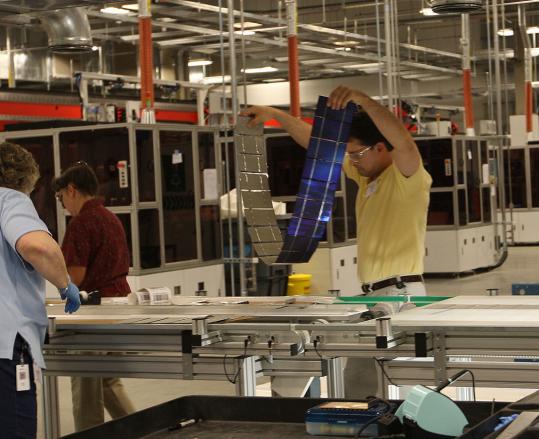
Evergreen Solar, which manufactures at its Devens plant the
wafers and cells used in solar panels, will move the final
assembly of those panels to a new plant in China.
(Joanne Rathe/Globe Staff/File 2008)
Evergreen shifts work to ChinaSolar panels won’t be assembled at Devens factory
Evergreen Solar, which manufactures at its Devens plant the
wafers and cells used in solar panels, will move the final
assembly of those panels to a new plant in China. Little more than a year after cutting the ribbon at a new factory in Devens built with more than $58 million in state aid, Evergreen Solar said yesterday that it will shift its assembly of solar panels from there to China.
About half of the 577 full-time and 230 contract employees at the
Devens factory are involved in putting the panels together.
Evergreen declined to say how many of those jobs would disappear
with the scheduled transfer next year to China, where it is
expanding because of lower costs.
Evergreen uses the Devens facility to make the silicon wafers and
cells used in the production of solar energy. It also assembles
those parts into the solar panels that increasingly adorn rooftops.
The wafers and cells will still be manufactured at Devens, but the
final assembly of the panels will move to China.
In a statement last night, Evergreen said it “remains committed to
the investment it has made in Massachusetts. Marlborough is the home
of our company headquarters and R&D facilities. Devens will continue
to be our US manufacturing location for wafer and cell production,
and our staffing plans will remain well within the employment
commitment we made to the state when we first announced our plans to
build the Devens facility.’’
In exchange for receiving $58.6 million in grants, loans, land, tax
incentives, and other aid to build in Massachusetts, Evergreen
pledged that it would add 350 new jobs, a goal that it has, to date,
far surpassed. However, the company disclosed in a financial filing
yesterday that it would write off $40 million worth of equipment at
Devens because of the production shift to China.
The company has been a poster child of the Patrick administration’s
efforts to develop a “green energy’’ industry cluster in
Massachusetts. But it has been struggling financially because of
increased competition from overseas producers and rapidly falling
prices for solar products. It recently persuaded the state to lend
it another $5 million to cover equipment purchases, though the state
has not yet released the funds.
The Patrick administration expressed dismay at Evergreen’s decision
to stop assembling the panels in Devens.
“Governor Patrick and I are disappointed by Evergreen Solar’s
decision to begin moving the final panel assembly component of their
business to China,’’ said Ian Bowles, secretary of the state’s
Executive Office of Energy and Environmental Affairs. “In just two
short years, Evergreen Solar has become a significant employer in
Massachusetts, and we will work hard to make sure the company
protects the maximum number of jobs in our state.’’
The company disclosed the China relocation in the filing of its
earnings for the third quarter of 2009. Through the first nine
months of this year, Evergreen lost $167 million, compared with
$33.6 million for the same period last year. The company’s stock
closed at $1.42 yesterday, down 6 cents.
In explaining the move to China, Evergreen chief executive Richard
M. Feldt said in the company’s filing that prices for assembled
panels have fallen more than 30 percent in just the last year,
making it “very difficult for manufacturers located in high-cost
regions to remain price competitive.’’
Earlier this year, Evergreen executives unveiled plans to expand in
Wuhan, China, where they said they expected to be able to make solar
panels for about $1.50 a watt - far cheaper than they could at
Devens.
Feldt did say that Evergreen could increase production of wafers and
cells at Devens “if market demand warrants.’’
In an interview with the Globe last month, chief financial officer
Michael El-Hillow said he expected some jobs at Devens to be
eliminated with a move to China. However, he added those losses
would likely be somewhat offset with a boost in production of wafers
and cells.
Todd Wallack of the Globe staff contributed to this report. Erin
Ailworth can be reached at
eailworth@globe.com.
© Copyright 2009 Globe Newspaper Company. To subscribe or
visit go to:
http://www.boston.com
|